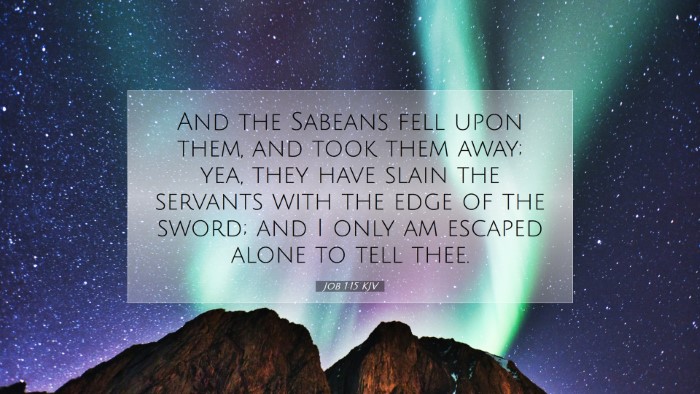Old Testament
Genesis Exodus Leviticus Numbers Deuteronomy Joshua Judges Ruth 1 Samuel 2 Samuel 1 Kings 2 Kings 1 Chronicles 2 Chronicles Ezra Nehemiah Esther Job Psalms Proverbs Ecclesiastes Song of Solomon Isaiah Jeremiah Lamentations Ezekiel Daniel Hosea Joel Amos Obadiah Jonah Micah Nahum Habakkuk Zephaniah Haggai Zechariah MalachiJob 1:15
Job 1:15 KJV
And the Sabeans fell upon them, and took them away; yea, they have slain the servants with the edge of the sword; and I only am escaped alone to tell thee.
Job 1:15 Bible Commentary
Commentary on Job 1:15
Job 1:15: "And the Sabeans fell upon them, and took them away; yea, they have slain the servants with the edge of the sword; and I only am escaped alone to tell thee."
This verse marks a pivotal moment in the narrative of Job, highlighting the sudden calamity that befalls his vast estate and the tragic loss of his servants. Understanding this passage requires delving into historical, theological, and literary insights provided by renowned commentaries. Below is a synthesis of insights from Matthew Henry, Albert Barnes, and Adam Clarke.
Historical Context
According to Albert Barnes, the Sabeans were known as a hostile tribe, likely from the region of Sheba, infamous for their plundering activities. This historical backdrop explains the sudden assault on Job's herdsmen. The raids of such tribes were common in the ancient Near East, where wealth was often associated with livestock.
Thematic Insights
Matthew Henry emphasizes the themes of loss and suffering present in Job's experience. This verse illustrates how quickly fortune can turn, and how vulnerable human life is to the whims of fate and external forces. Job, a man of great wealth and prominence, finds his life shattered within moments, serving as a poignant reminder of the transient nature of earthly possessions.
The Sovereignty of God
Adam Clarke notes that within this calamity, the overarching narrative reveals the sovereignty of God even amidst suffering. The Sabeans’ actions, though evil, are ultimately permitted within God's governance of the world. This suggests a tension between divine providence and human agency that permeates the book of Job.
The Characters Involved
In analyzing who the Sabeans were, Henry highlights that they are not just antagonists but serve as instruments in a larger divine methodology for testing Job’s faith. The mention of the servants adds a layer of human tragedy to the loss, indicating that Job’s wealth was not merely material but also contained relationships and livelihoods.
The Role of the Messenger
Verse 15 concludes with the phrase, "I only am escaped alone to tell thee," which underscores the role of the messenger. Clarke posits that this figure symbolizes the survivor's burden, laden with the heavy task of delivering sorrowful tidings. The emotional weight of being the sole survivor amplifies the tragedy, evoking the reader's sympathy for Job’s plight.
The Nature of Wealth and Security
Barnes comments on how Job's possessions, though extensive, provided no ultimate security against misfortune. The Sabeans’ attack serves as a reminder that wealth can be ephemeral. This challenges readers and believers alike to reconsider where true security lies—whether in material possessions or in a life anchored in faith and trust in God.
Application for Today
This narrative is not only ancient history; it bears timely wisdom for modern congregations. Henry posits that believers today should prepare to face calamities, understanding that suffering is a part of the human experience. The key lesson is that stability must be founded on spiritual convictions rather than earthly gains.
Theological Reflections
Job's response to this calamity (which is explored in subsequent verses) is critical for theological reflection. Clarke reasons that Job’s ability to retain his faith amidst despair models a profound trust in God that believers are called to emulate. Such faith does not deny sorrow but acknowledges God's overarching plan, even when it seems unfathomable.
Concluding Thoughts
The narrative of Job and the tumultuous events surrounding him, exemplified in Job 1:15, invites profound reflection on the nature of suffering, faith, and the mysterious ways in which God interacts with His creation. The combined insights from Matthew Henry, Albert Barnes, and Adam Clarke provide a rich framework for understanding the depths of human suffering while still recognizing the sovereignty and mercy of God.
Summary
- The Sabeans symbolize external forces beyond Job’s control.
- The loss of servants highlights the human aspect of Job's tragedy.
- God's sovereignty is a key theme despite the presence of evil.
- The role of the messenger amplifies the gravity of tragedy.
- This narrative challenges contemporary understanding of wealth and security.
- Job’s faith amidst suffering serves as a compelling model for believers today.
This commentary not only serves as a reflection on the specific verse but also as an allegory for the broader human condition and the unshakeable faith that can prevail through life’s most tumultuous storms.


